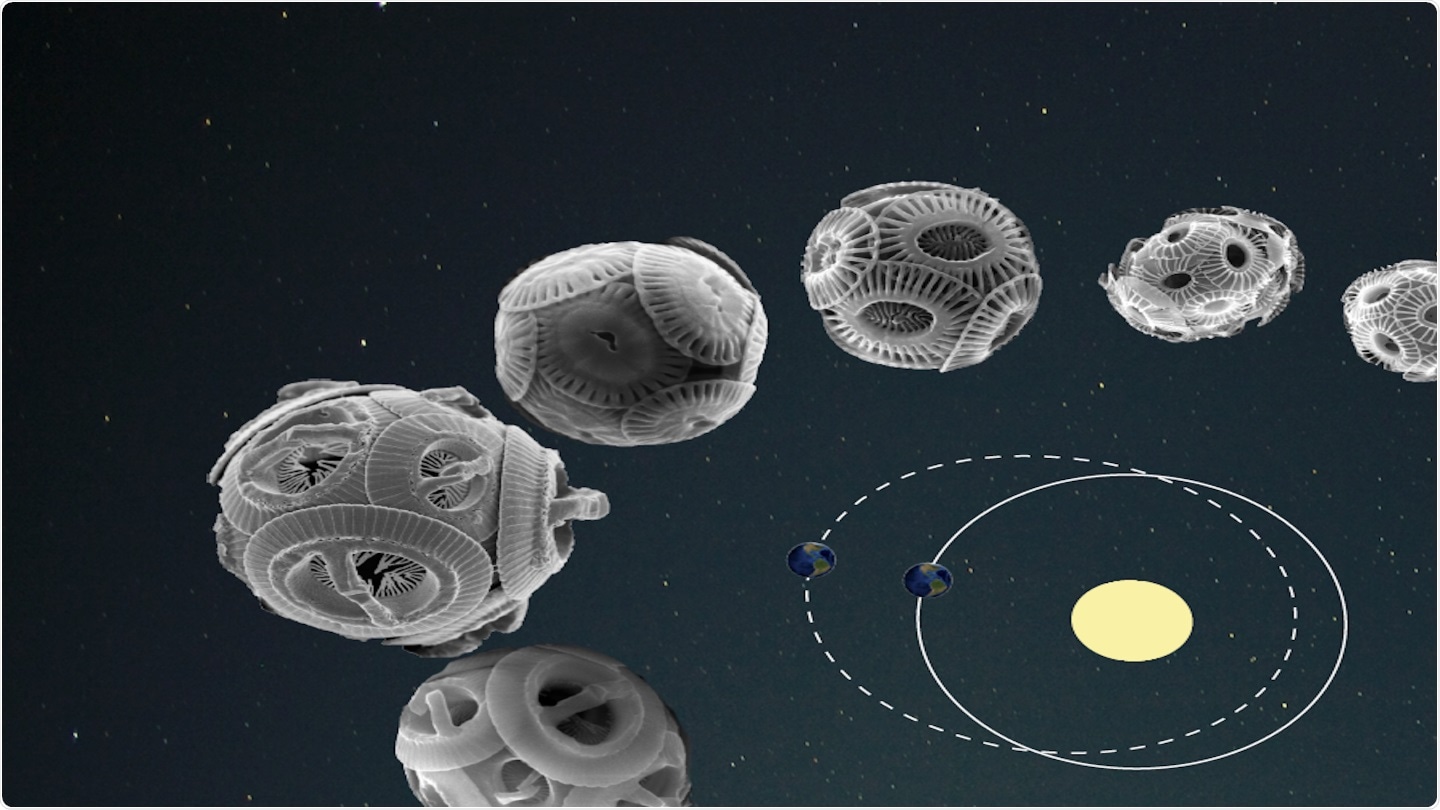An international team including Rutgers-New Brunswick scientists utilized artificial intelligence techniques and traced the evolution of coccolithophores—an ocean-dwelling phytoplankton group, above 2.8 million years.

Emergence of new species of the coccolithophere (calcite producing marine algae), paced by approximately 400,000 year variations in the shape of Earth’s revolutions around the sun (eccentricity shown in inset) has been documented by the changes in the shape and size of their internal calcite plates shown here in photos obtained from scanning electron microscope. Image Credit: Figure courtesy of Dr Luc Beaufort.
The observations unravel new proof that evolutionary cycles in a marine phytoplankton group are associated with changes in tropical seasonality, highlighting the connection between biological evolution and climate change. The research was published in the Nature journal.
Coccolithophores are profuse single-celled organisms that enclose themselves with microscopic plates composed of calcium carbonate, named coccoliths. Coccolithophores play a vital role in the carbon cycle owing to their photosynthetic activity, mineral production and are extensively found in the world’s oceans.
Researchers were of the notion that the impact of climate change on animals, plants, and other organisms takes place in cycles, which are reversed when each cycle is accomplished, thus deleting any minor evolutionary changes at the time of each cycle. However, evolutionary changes, as comprehended from the fossil record, are non-cyclic trends that take place over millions of years.
However, the scientists’ novel research reveals that evolutionary cycles in coccolithophores are assigned to alterations in tropical seasonality associated with shifts in the Earth’s orbit that happen around every 400,000 years. The research might also provide a novel understanding of the approximately 400,000 year-long variations in records of the oceans’ carbon cycle.
The production of calcium carbonate by these prolific coccolithophore species likely impacted the chemistry of seawater and the oceanic carbon cycle, which in turn could have significant consequences for Earth’s climate through the ocean influence on the concentration of atmospheric carbon dioxide.”
Yair Rosenthal, Study Co-Author and Distinguished Professor, Rutgers University
The scientist's employed AI techniques to analyze the shape of around nine million coccoliths from over 8,000 samples. Each of them represents a point in geological space or time, tracking coccolithophore evolution over 2.8 million years. The samples were from tropical sediment cores from the ocean floor retrieved during scientific drilling expeditions.
Automated optical microscopes seized the images, from which species were identified and their weight and size evaluated. These weight and size records showed the presence of cycles lasting 100,000 years and 400,000 years.
These correspond to differences in the shape of the rotation of the Earth around the sun, called the eccentricity of the Earth's orbit. Surprisingly, these cycles are not of similar length as those pursued by global climate cycles and glaciations over the last 2.8 million years.
The eccentricity cycles have multiple effects on the earth. One of the little-known effects is the periodic appearance of seasons at the equator. At the present time, when Earth follows an almost circular orbit, the equator experiences a very weak change in seasons, but when the orbit is eccentric and shaped more like an ellipse than a circle, seasonal changes in tropical regions become stronger.”
Luc Beaufort, Study Lead Author, Rutgers University
This impact on tropical seasonality is distinct from the reason of seasonality at higher latitudes, which is driven mostly by the inclination of the earth’s axis of rotation.
We modeled the effects of changing seasonality driven by eccentricity in the tropical ocean, demonstrating that the effects on marine ecosystems are significant and could explain the adaptation of coccolithophores to new niches created by these cyclical seasonal conditions.”
Clara Bolton, Study Co-Author, Rutgers University
Source:
Journal reference:
Beaufort, L., et al. (2021) Cyclic evolution of phytoplankton forced by changes in tropical seasonality. Nature. doi.org/10.1038/s41586-021-04195-7.